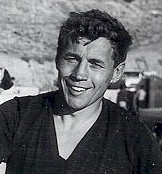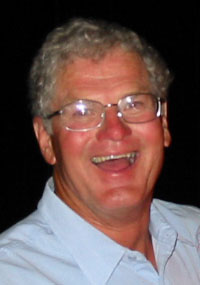|
Dreaming
California memoir By Dennis Surtees |
 Skippers don't have a crew; they have a partner. Of all my terrific partners, I
ought to mention Pip Pearson first. Yes, that's right, your venerable former president was
once young and dumb enough to like sailing with me. We first met in Australia at the 1966
worlds. While I was struggling to a great 27th place, Pip sailed with Paul
Elvstrom to a second, a second which, under most scoring systems would have been a first.
That next summer, Pip came via California to visit Paul in Denmark. He asked to visit us
for two days and stayed for two years. He became a de facto member of our family. At
weekends we sailed, on the way to a couple of North American Championships among other
things; during the week he painted our house, then all my colleagues' homes, repaired all
the leaky pipes in our old house, tore out an old kitchen and built a new redwood deck.
All that was before 2 p.m. because at that time he took the 5-oh down to Palo Alto Y.C.so
that it would be ready for us to start sailing when I finished in the operating room at
three.
Skippers don't have a crew; they have a partner. Of all my terrific partners, I
ought to mention Pip Pearson first. Yes, that's right, your venerable former president was
once young and dumb enough to like sailing with me. We first met in Australia at the 1966
worlds. While I was struggling to a great 27th place, Pip sailed with Paul
Elvstrom to a second, a second which, under most scoring systems would have been a first.
That next summer, Pip came via California to visit Paul in Denmark. He asked to visit us
for two days and stayed for two years. He became a de facto member of our family. At
weekends we sailed, on the way to a couple of North American Championships among other
things; during the week he painted our house, then all my colleagues' homes, repaired all
the leaky pipes in our old house, tore out an old kitchen and built a new redwood deck.
All that was before 2 p.m. because at that time he took the 5-oh down to Palo Alto Y.C.so
that it would be ready for us to start sailing when I finished in the operating room at
three.
That was the time at PAYC when the wind really blew and we would sail until the boat or we
broke or the gear was so messed up that we had to quit. We then packed up the boat, took
it home and spent the evening getting her ready for the next day. I put this in the past
tense because PAYC got closed down by environmentalists who thought that all these
yachties were frightening away the yellow tailed marsh warbler (or something like that).
 That
pattern of training was one which Jay Kuncl, Steve Owen, Bertrand and Cayard and everyone
else who sailed with me came to recognize. Come to think of it, quite a number of my crews
finished up living with us for the summer. Surely that was because they were sailing with
me and had nothing to do with our five teenage daughters. Right after the 1966 NAs at
PAYC, the Canadians persuaded us to drive up to Vancouver Island for the Canadian
Championship. Jenny, Pip and I piled into a car, abandoned our kids to a baby sitter and
drove the 1000 miles to get there just in time to race. We had a really good shot of
winning but I had to get back to work the following Monday so we didn't even sail the last
race. We just made the last ferry, then drove back through the night. You should
understand that Pip has had ongoing eye problems. I didn't really understand until later
that at night he could only see great star bursts instead of headlights; he had driven
half the distance!
That
pattern of training was one which Jay Kuncl, Steve Owen, Bertrand and Cayard and everyone
else who sailed with me came to recognize. Come to think of it, quite a number of my crews
finished up living with us for the summer. Surely that was because they were sailing with
me and had nothing to do with our five teenage daughters. Right after the 1966 NAs at
PAYC, the Canadians persuaded us to drive up to Vancouver Island for the Canadian
Championship. Jenny, Pip and I piled into a car, abandoned our kids to a baby sitter and
drove the 1000 miles to get there just in time to race. We had a really good shot of
winning but I had to get back to work the following Monday so we didn't even sail the last
race. We just made the last ferry, then drove back through the night. You should
understand that Pip has had ongoing eye problems. I didn't really understand until later
that at night he could only see great star bursts instead of headlights; he had driven
half the distance!
Pip and I went to France (La Baule) for
the 1967 Worlds. He managed to stay alive while driving round Europe with Ian Gray in a
clapped out old car, crashing through railroad gates when they were inconveniently closed
and generally acting the way young Aussies tend to do when "doing " Europe.. He
picked up our first Parker in England and we drifted through a no-wind regatta coming to a
not very respectable 35th out of 135. The sailing became irrelevant to the serious
on-shore activities. It was where we saw our class President, Fred Garner hoisted 15 feet
into the air on stacked tables and chairs while he waved a champagne bottle at the
admiring crowd. I think that he was about 75 years of age at the time! It was followed by
the Swedes carrying in a beach surf boat out of which popped an extremely scantily dressed
female (also waving a champagne bottle). That, too, was the regatta where Bob Miller (late
to become Ben Lexen) and Craig Whitworth brought the first entirely fiberglass Binks 505.
Except it wasn't! The French measurer insisted that they did some very radical things to
the hull, none of which helped its speed. It didn't matter to them because they had just
come from their successful attempt to make Bob's boat, the Contender, an Olympic class.
We were able to drive up and down California quite quickly because whenever we were
stopped by the CHP, Pip would produce his Aussie passport, adopt an outrageous down under
accent and claim that he was on the way back to Oz within the next two days. Every
patrolman just gave up. In the end, the going back in the next few days came true. Pip had
been a "wetback" for two years when finally the immigration people caught up
with him. A rather ominous phone call came in one day asking if we knew where he was. Of
course, we told them that he had already gone back. That was to become true within a
couple of weeks.
He came back a couple of years later and we sailed together again in 1970 and 1971. He
took the boat to Narragansett Bay where we won the NAs. We also tried to start a sailing
business. We actually were the first U.S. representatives of Musto and Hyde!
What a great might have been. Family matters took him back to Adelaide but we have no
greater friend anywhere in the world than Pip today.
TANK TALK - SPRING 2001